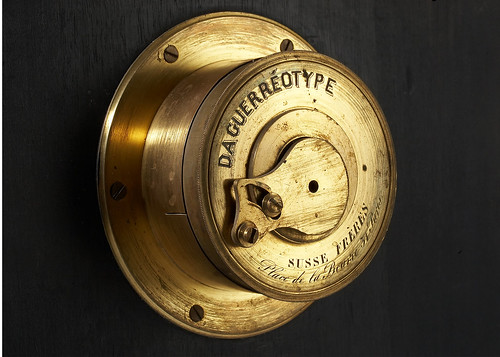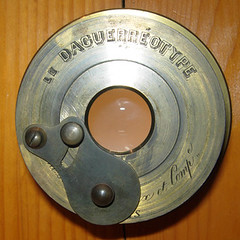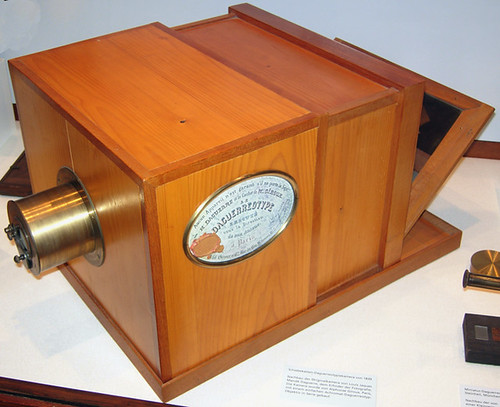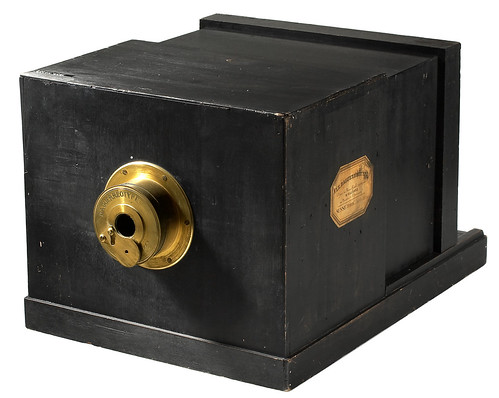Difference between revisions of "Le Daguerreotype"
m (→Links) |
Hanskerensky (talk | contribs) m (→Links: Repaired Link URL) |
||
| (15 intermediate revisions by 3 users not shown) | |||
| Line 20: | Line 20: | ||
}} | }} | ||
|} | |} | ||
| − | '''Le Daguerreotype''' was [[Louis Jacques Mandé Daguerre]]'s main contribution to camera history: The [[sliding box camera]] was designed by him for his [[Daguerreotype Process|Daguerreotype process]]. Two variants were made since he gave production licences to two Parisian camera makers, [[Alphonse Giroux]] and | + | '''Le Daguerreotype''' was [[Louis Jacques Mandé Daguerre]]'s main contribution to camera history: The [[sliding box camera]] was designed by him for his [[Daguerreotype Process|Daguerreotype process]]. Two variants were made since he gave production licences to two Parisian camera makers, Daguerre's brother-in-law [[Alphonse Giroux]] and the [[Susse Frères|brethren Susse]]. |
| − | This was a sliding box camera - made of two boxes lined with black velvet, one slightly smaller, a close fit into the larger. The inner box with open front and screen in the back had to be shifted carefully into or out of the outer box for focusing. After focusing the screen had to be replaced with the holder for the light-sensitized plate. The front of the outer box held a [[meniscus lens]] in a brass barrel, named like the camera ''Le Daguerreotype'' and made by [[Charles Louis Chevalier|Charles Chevalier]] or by N. P. Lerebours. The lenses differed slightly in max. aperture (f14 to f17) and in [[Lens#Focal_Length|focal length]]. The camera was sold together with a plate holder with "barn doors", a plate sensitizing box, and a developing box. | + | Probably Giroux worked together with the optician Bianchi who had his shop in the same street. Thus the original "Le Daguerreotype" of Giroux with Daguerre's quality seal was basically the same as the sliding box camera offered by Bianchi, unsealed. Giroux's original daguerreotype equipment was advertised in ''La GAZETTE DE FRANCE'' on Aug. 21st 1839, already two days after the official presentation of the daguerreotype process. |
| + | |||
| + | One surviving camera of the [[Susse Frères|Susse]] brothers' production was sold in a 2007 auction for a record price of 580,000€, and one camera made by Giroux in May 2010 for a record 732,000€ ($898,000 US)<ref>[http://britishphotohistory.ning.com/profiles/blogs/vintage-camera-auctioned-for British photographic history site]</ref>. Originally the Susse variant was cheaper. It's price was just 350 Francs instead of 400 for Giroux's version. It was advertised on Sept. 5th 1839 by French magazine "La Quotidienne". Its lens was a 382mm lens made by [[Charles Louis Chevalier]]. | ||
| + | |||
| + | The text on the Susse Frères camera's seal was "''LE DAGUERRÉOTYPE, D´aprés les plans officiels déposés par Mr. DAGUERRE au Ministére de l´Interérieur. SUSSE Frères, 31, Place de la Bourse''". | ||
| + | |||
| + | The text on Giroux's camera was "''Aucun Appareil n’est garanti s’il ne porte la Sign.. de Mr. Daguerre et le Cachet de Mr. Giroux. Le DAGUERRÉOTYPE, exécute’ sous la Direction de son Auteur, à Paris, chez Alph.Giroux et Cie., Rue du Coq. St Honoré No7''" | ||
| + | |||
| + | The dimensions of both types were exactly the same. This first ever marketed photographic camera was made for 216x167mm plates. Thus it almost pre-defined the later standard ''full plate'' format 216x165mm. | ||
| + | |||
| + | This was a [[sliding box camera]] - made of two boxes lined with black velvet, one slightly smaller, a close fit into the larger. The inner box with open front and screen in the back had to be shifted carefully into or out of the outer box for focusing. After focusing the screen had to be replaced with the holder for the light-sensitized plate. The front of the outer box held a [[meniscus lens]] in a brass barrel, named like the camera ''Le Daguerreotype'' and made by [[Charles Louis Chevalier|Charles Chevalier]] or by N. P. Lerebours. Bianchi's camera copies may have got lenses made by Bianchi. The lenses differed slightly in max. aperture (f14 to f17) and in [[Lens#Focal_Length|focal length]]. The camera was sold together with a plate holder with "barn doors", a plate sensitizing box, and a developing box. | ||
| Line 32: | Line 42: | ||
*[http://www.news24.com/Entertainment/OffBeat/Worlds-oldest-camera-sold-20070526 Susse's camera] at news24 | *[http://www.news24.com/Entertainment/OffBeat/Worlds-oldest-camera-sold-20070526 Susse's camera] at news24 | ||
*[http://www.liveauctioneers.com/item/3633892 auction catalogue page], here [http://www.novacon.com.br/odditycameras/LeDague.htm another] | *[http://www.liveauctioneers.com/item/3633892 auction catalogue page], here [http://www.novacon.com.br/odditycameras/LeDague.htm another] | ||
| − | *[http://hem.bredband.net/tjmop/girouxswedensw.htm Swedish page] by Åke Hultman | + | *[https://web.archive.org/web/20150323174319/http://hem.bredband.net/tjmop/girouxswedensw.htm Swedish page] by Åke Hultman (archived) |
| − | *[ | + | *[https://digital.deutsches-museum.de/de/digital-catalogue/collection-object/4287/ Le Daguerreotype] at Deutsches Museum Munich |
| − | *[http://www.novacon.com.br/odditycameras/LeDague.htm page by Novacon] | + | *[http://www.novacon.com.br/odditycameras/LeDague.htm Le Daguerréotype Susse Frères] page by [http://www.novacon.com.br Novacon] |
{{Flickr_image | {{Flickr_image | ||
| Line 40: | Line 50: | ||
|image= http://farm5.static.flickr.com/4081/4872367744_5986b95b56.jpg | |image= http://farm5.static.flickr.com/4081/4872367744_5986b95b56.jpg | ||
|image_align= left | |image_align= left | ||
| − | |image_text= Lens built by [[Charles Chevalier]] for the | + | |image_text= Lens built by [[Charles Chevalier]] for the [[Susse Frères]] Daguerreotype camera. |
|image_by= liudmilanelson1x1 | |image_by= liudmilanelson1x1 | ||
|image_rights=cc | |image_rights=cc | ||
| Line 57: | Line 67: | ||
[[Category:France]] | [[Category:France]] | ||
[[Category:D|Daguerreotype]] | [[Category:D|Daguerreotype]] | ||
| + | [[Category:L]] | ||
Latest revision as of 06:49, 25 March 2022
| ||
|
Le Daguerreotype was Louis Jacques Mandé Daguerre's main contribution to camera history: The sliding box camera was designed by him for his Daguerreotype process. Two variants were made since he gave production licences to two Parisian camera makers, Daguerre's brother-in-law Alphonse Giroux and the brethren Susse.
Probably Giroux worked together with the optician Bianchi who had his shop in the same street. Thus the original "Le Daguerreotype" of Giroux with Daguerre's quality seal was basically the same as the sliding box camera offered by Bianchi, unsealed. Giroux's original daguerreotype equipment was advertised in La GAZETTE DE FRANCE on Aug. 21st 1839, already two days after the official presentation of the daguerreotype process.
One surviving camera of the Susse brothers' production was sold in a 2007 auction for a record price of 580,000€, and one camera made by Giroux in May 2010 for a record 732,000€ ($898,000 US)[1]. Originally the Susse variant was cheaper. It's price was just 350 Francs instead of 400 for Giroux's version. It was advertised on Sept. 5th 1839 by French magazine "La Quotidienne". Its lens was a 382mm lens made by Charles Louis Chevalier.
The text on the Susse Frères camera's seal was "LE DAGUERRÉOTYPE, D´aprés les plans officiels déposés par Mr. DAGUERRE au Ministére de l´Interérieur. SUSSE Frères, 31, Place de la Bourse".
The text on Giroux's camera was "Aucun Appareil n’est garanti s’il ne porte la Sign.. de Mr. Daguerre et le Cachet de Mr. Giroux. Le DAGUERRÉOTYPE, exécute’ sous la Direction de son Auteur, à Paris, chez Alph.Giroux et Cie., Rue du Coq. St Honoré No7"
The dimensions of both types were exactly the same. This first ever marketed photographic camera was made for 216x167mm plates. Thus it almost pre-defined the later standard full plate format 216x165mm.
This was a sliding box camera - made of two boxes lined with black velvet, one slightly smaller, a close fit into the larger. The inner box with open front and screen in the back had to be shifted carefully into or out of the outer box for focusing. After focusing the screen had to be replaced with the holder for the light-sensitized plate. The front of the outer box held a meniscus lens in a brass barrel, named like the camera Le Daguerreotype and made by Charles Chevalier or by N. P. Lerebours. Bianchi's camera copies may have got lenses made by Bianchi. The lenses differed slightly in max. aperture (f14 to f17) and in focal length. The camera was sold together with a plate holder with "barn doors", a plate sensitizing box, and a developing box.
Notes
Links
- Message about the Susse camera auction in photoscala [1]
- Susse's camera at news24
- auction catalogue page, here another
- Swedish page by Åke Hultman (archived)
- Le Daguerreotype at Deutsches Museum Munich
- Le Daguerréotype Susse Frères page by Novacon

|
| Lens built by Charles Chevalier for the Susse Frères Daguerreotype camera. image by liudmilanelson1x1 (Image rights) |

|
| Replica lens, with pivoting cap. image by AWCam (Image rights) |

